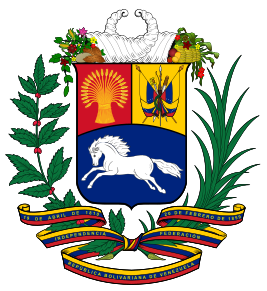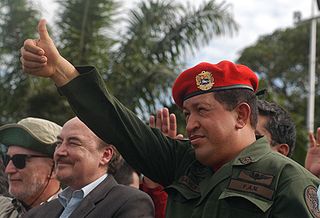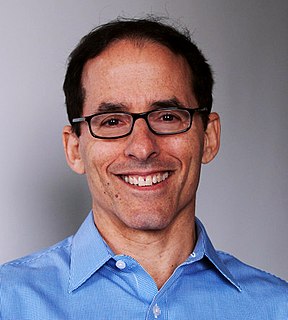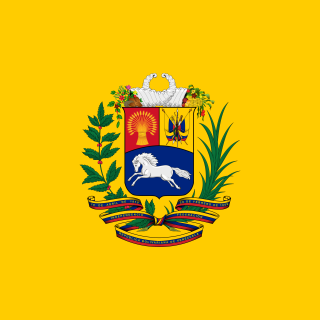
The Bolivarian Revolution is a political process in Venezuela that was led by Venezuelan President Hugo Chávez, the founder of the Fifth Republic Movement and later the United Socialist Party of Venezuela (PSUV). The Bolivarian Revolution is named after Simón Bolívar, an early 19th-century Venezuelan and Latin American revolutionary leader, prominent in the Spanish American wars of independence in achieving the independence of most of northern South America from Spanish rule. According to Chávez and other supporters, the Bolivarian Revolution seeks to build an inter-American coalition to implement Bolivarianism, nationalism and a state-led economy.
Bolivarianism is a mix of pan-American, socialist and national-patriotic ideals fixed against injustices of imperialism, inequality and corruption named after Simón Bolívar, the 19th-century Venezuelan general and liberator from the Spanish monarchy then in abeyance, who led the struggle for independence throughout much of South America.

The Bolivarian missions are a series of over thirty social programs implemented under the administration of former Venezuelan president Hugo Chávez and continued by Chávez's successor, Nicolás Maduro. The programs focus on social justice, social welfare, anti-poverty, educational, and military recruiting. They draw their name from the historical South American hero, Simón Bolívar.
Mission Mercal is a Bolivarian Mission established in Venezuela under the government of Hugo Chávez. The Mission involves a state-run company called Mercados de Alimentos, C.A. (MERCAL), which provides subsidised food and basic goods through a nationwide chain of stores. In 2010 Mercal was reported as having 16,600 outlets, "ranging from street-corner shops to huge warehouse stores," in addition to 6000 soup kitchens. Mercal employs 85,000 workers.
Misión Guaicaipuro is one of the Bolivarian Missions initiated by former Venezuelan president Hugo Chávez. The program is carried out by the Venezuelan Ministry of Environment and Natural Resources. It seeks to restore communal land titles and human rights to Venezuela's numerous indigenous communities, in addition to defending these rights against resource and financial speculation by the dominant culture. The mission is named for the famous Venezuelan indigenous tribal chief Guaicaipuro, who was instrumental in leading native resistance against Spanish colonization of Venezuela.
Mission Robinson is one of the Bolivarian Missions implemented by Hugo Chávez in 2003. The name "Robinson" was given to the Mission in remembrance of the pseudonym adopted during his exile from Spanish America by Venezuelan philosopher and educator Simón Rodríguez (1769–1854).
Mission Miranda is one of the Bolivarian Missions implemented by late Venezuelan president Hugo Chávez. The program establishes a Venezuelan military reserve composed of ordinary Venezuelan citizens given light arms to defend the territory in the case of an invasion. Arms purchases intended to supply the program included the acquisition of 100,000 Russian AK-103 rifles which has provoked criticism from the U.S. and Colombian government over what seems to be an unnecessary increase of weapon stocks.
Plan Bolívar 2000 was the first of the Bolivarian Missions enacted under administration of Venezuelan President Hugo Chávez. According to the United States Department of State, Chávez wanted to "send the message that the military was not a force of popular repression, but rather a force for development and security". The State Department also commented that this happened "only 23 days after his inauguration" and that he wanted to show his closest supporters "that he had not forgotten them". The plan involved around 40,000 Venezuelan soldiers engaged in door-to-door anti-poverty activities, including mass vaccinations, food distribution in slum areas, and education. The program also transported thousands of poor and ill Venezuelans at cost by military cargo planes and helicopters to seek employment and medical care.

The military career of Hugo Chávez spans the seventeen years (1975–1992) that the later President of Venezuela spent in the Venezuelan army. Leader of the "Bolivarian Revolution", Chávez is known for his professed and self-proclaimed democratic socialist governance, his promotion of Latin American integration, and his radical critique of neoliberal globalization and United States foreign policy.

Mark Alan Weisbrot is an American economist and columnist. He is co-director with Dean Baker of the Center for Economic and Policy Research (CEPR) in Washington, D.C. Weisbrot is President of Just Foreign Policy, a non-governmental organization dedicated to reforming United States foreign policy.

Chavismo, also known as Chavism and Chavezism, is a left-wing political ideology based on the ideas, programs and government style associated with the former Venezuelan President Hugo Chávez that combines elements of socialism, left-wing populism, patriotism, internationalism, Bolivarianism, feminism, green politics and Caribbean and Latin American integration.

The United Socialist Party of Venezuela is a socialist political party in Venezuela which resulted from the fusion of some of the political and social forces that support the Bolivarian Revolution led by President Hugo Chávez.

Revolutionary Movement Tupamaro or Tupamaro is a far left Marxist political party and one of the most prominent colectivos in Venezuela. Several Tupamaros participate in peaceful movements while some believe the "idea of armed struggle as a means to gain power." The group supports the National Liberation Army (ELN) and allegedly had ties with FARC.

Socialism of the 21st century is an interpretation of socialist principles first advocated by German sociologist and political analyst Heinz Dieterich and taken up by a number of Latin American leaders. Dieterich argued in 1996 that both free market industrial capitalism and 20th-century socialism have failed to solve urgent problems of humanity like poverty, hunger, exploitation, economic oppression, sexism, racism, the destruction of natural resources, and the absence of a truly participative democracy. Socialism of the 21st century has democratic socialist elements, but it primarily resembles Marxist revisionism.

Venezuela is one of the world's largest exporters of oil and has the world's largest proven oil reserves at an estimated 296.5 billion barrels as of 2012.

The Battle of Las Queseras del Medio was an important battle of the Venezuelan War of Independence. It took place on April 2, 1819. The forces of José Antonio Páez consisted of 153 lancers, who were llaneros. They were pitted against more than 1,000 Spanish cavalry. The battle is noted for a phrase of Páez’s that became famous: ¡Vuelvan Caras! –although some sources state that he actually said ¡Vuelvan, Carajo! .).

From his election in 1998 until his death in March 2013, the administration of the late Venezuelan President Hugo Chávez proposed and enacted economic policies known as the Bolivarian Revolution.

Aló Presidente was a largely unscripted talk show that was hosted by Venezuelan President Hugo Chávez. It was broadcast on Venezuelan state television and radio stations every Sunday at 11:00 AM. The program did not have a fixed ending time, but usually ended by 5:00 PM, or as the program dynamics permitted. The show promoted the "Bolivarian Revolution" and blamed Venezuelan economic problems on its northern neighbor, the United States. Many Venezuelans tuned in because Chávez was known for unveiling new financial assistance packages every weekend. Beginning in 1999, Chávez spent an average of 40 hours a week on television promoting his "Bolivarian Revolution" policies.

Bolivarian propaganda is a form of nationalist propaganda, especially in Venezuela, that utilizes the ideals espoused by Simón Bolívar, who helped lead Venezuela and other Latin American countries to independence from Spain, to exploit populist sentiments in support of local leaders. This type of propaganda has been particularly associated with Hugo Chávez's Bolivarian Revolution, which used emotional arguments to gain attention, exploit the fears of the population, create external enemies for scapegoat purposes, and produce nationalism within the population, causing feelings of betrayal for support of the opposition. The World Politics Review stated that as Chávez began "transforming Venezuela into a socialist state" that propaganda was "an important role in maintaining and mobilizing government supporters". The image of Chávez is seen on sides of buildings, on T-shirts, on ambulances, on official Petróleos de Venezuela (PDVSA) billboards, and as action figures throughout Venezuela. A 2011 article by The New York Times says Venezuela has an "expanding state propaganda complex" while The Boston Globe described Chávez as "a media savvy, forward-thinking propagandist" and that he had "the oil wealth to influence public opinion".
















